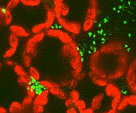Plant Pathology, Department of

Department of Plant Pathology: Faculty Publications
Document Type
Article
Date of this Version
2017
Citation
Marroquin-Guzman M, Sun G, Wilson RA (2017) Glucose-ABL1-TOR Signaling Modulates Cell Cycle Tuning to Control Terminal Appressorial Cell Differentiation. PLoS Genet 13(1): e1006557.
Abstract
The conserved target of rapamycin (TOR) pathway integrates growth and development with available nutrients, but how cellular glucose controls TOR function and signaling is poorly understood. Here, we provide functional evidence from the devastating rice blast fungus Magnaporthe oryzae that glucose can mediate TOR activity via the product of a novel carbon- responsive gene, ABL1, in order to tune cell cycle progression during infection-related development. Under nutrient-free conditions, wild type (WT) M. oryzae strains form terminal plant-infecting cells (appressoria) at the tips of germ tubes emerging from three-celled spores (conidia). WT appressorial development is accompanied by one round of mitosis followed by autophagic cell death of the conidium. In contrast, Δabl1 mutant strains undergo multiple rounds of accelerated mitosis in elongated germ tubes, produce few appressoria, and are abolished for autophagy. Treating WT spores with glucose or 2-deoxyglucose phenocopied Δabl1. Inactivating TOR in Δabl1 mutants or glucose-treated WT strains restored appressorium formation by promoting mitotic arrest at G1/G0 via an appressorium- and autophagy-inducing cell cycle delay at G2/M. Collectively, this work uncovers a novel glucose- ABL1-TOR signaling axis and shows it engages two metabolic checkpoints in order to modulate cell cycle tuning and mediate terminal appressorial cell differentiation. We thus provide new molecular insights into TOR regulation and cell development in response to glucose.


Comments
Copyright © 2017 Marroquin-Guzman et al. This is an open access article distributed under the terms of the Creative Commons Attribution License